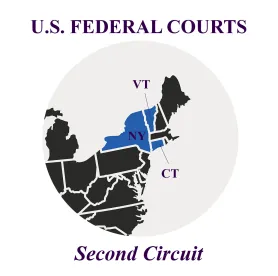Breathing new life into “uniqueness” (of an employee’s services) as a legitimate business interest supporting enforcement of non-competition covenants under New York law, the U.S. Court of Appeals for the Second Circuit affirmed the grant of a preliminary injunction barring a designer with an active social media presence from competing with her former employer. JLM Couture, Inc. v. Gutman, No. 21-870-cv (2d Cir. Jan. 25, 2022).
The Second Circuit has jurisdiction over Connecticut, New York, and Vermont.
Uniqueness
“Uniqueness” as a protectable interest is not new. In 1999, the Second Circuit held, in Ticor Title Ins. Co. v. Cohen, 173 F.3d 63, 70 (2d Cir.), that uniqueness was a protectable interest warranting enforcement of non-compete under the facts of that case. (In the same year and just six weeks later, New York’s highest court held in BDO Seidman v. Hirshberg, 712 N.E.2d 1220, that an employee’s services were not unique, but goodwill in client relationships supported partial enforcement of restrictive covenant under the facts of that case.)
Over the past two decades, however, courts in the Second Circuit (including state and federal courts in New York) have focused mainly on confidential information, trade secrets, and customer goodwill when analyzing whether an employer has a business interest that warrants binding an employee to a non-compete.
Background
In 2011, Haley Paige Gutman, a bridal dress designer with an active social media presence, entered into an employment agreement with JLM Couture, a company that designs and manufactures luxury bridal fashion. The agreement contained a non-compete clause prohibiting Gutman from competing with JLM during her employment with JLM. As amended, the agreement extended Gutman’s employment through August 1, 2022, but it did not contain a provision permitting her to resign before that date.
In late-2019, following a dispute over a contract amendment, Gutman locked JLM out of the Instagram account bearing the name @misshayleypaige. JLM did not seek to regain access to the account, apparently believing this was a negotiation tactic. Approximately a year later, in November 2020, Gutman informed JLM that she would “not be posting any JLM related business” to the @misshayleypaige Instagram account. On December 15, 2020, JLM filed suit against Gutman asserting breach of contract, conversion, trespass, and trademark infringement, among other claims.
The next day, the U.S. District Court for the Southern District of New York entered a temporary restraining order directing Gutman to turn over control of disputed social media accounts, including the @misshayleypaige Instagram account, to JLM (the Second Circuit later vacated this portion of the pretrial relief).
The next day, December 17, 2020, Gutman released a series of public videos, on a separate Instagram account, announcing that she had decided to resign from JLM, accusing JLM of deceiving the followers of the @misshayleypaige Instagram account, and otherwise criticizing JLM and its lawsuit. Gutman alleged JLM then stopped paying her base salary and paid her no further incentive compensation (which, per the contract, was to be calculated based on JLM’s sales of Gutman-designed products and was to be paid for 10 years following the termination of Gutman’s employment).
Following a hearing, the trial court issued a preliminary injunction barring Gutman from engaging in the bridal fashion business or otherwise competing with JLM until August 1, 2022, the end of the employment term under her employment agreement. (The court also prohibited Gutman from using her own name, or any derivatives, in trade or commerce until the resolution of the litigation. The Second Circuit affirmed this. If JLM prevails at trial, this prohibition could become perpetual. It is an extraordinary remedy. As this part of the relief is grounded largely in trademark and intellectual property law, it is beyond the scope of this article.)
Second Circuit on Uniqueness
In affirming the trial court’s ruling that the non-competition provision is enforceable, the Second Circuit focused solely on the uniqueness of Gutman’s services (which were not disputed) as giving rise to JLM’s protectable interest. The Second Circuit decision did not examine what, if any, confidential information (let alone trade secrets) or customer goodwill of JLM was worthy of protection.
Significantly, Gutman’s employment agreement contained no provision permitting her to resign prior to August 1, 2022. Naturally, no court could compel her to provide services to JLM. The Second Circuit, however, found that preventing her from competing was the appropriate remedy. The Court called it “a restriction that would have bound Gutman if she had continued to work for JLM as contractually required.”
Additionally, neither the trial court nor the Second Circuit was swayed by the fact that JLM stopped paying Gutman after her resignation. Gutman’s “faithful performance” of her duties was a condition precedent to JLM’s payment obligations. The Court explained that JLM had no duty to pay Gutman if she was not working, and so JLM did not breach the employment agreement by failing to do so. Therefore, JLM’s failure to pay did not bar the Court from enjoining Gutman from competing for the rest of the term of the employment agreement.
***
JLM Couture exemplifies the importance of carefully drafting the terms of employment agreements and ensuring that they are “tailored” (pun intended) to the employee to be bound. In this case, the precise language of the termination, non-competition, intellectual property assignment, and incentive compensation clauses all were determinative factors. The case also demonstrates the importance of ensuring that the interplay between the various provisions of employment agreements reflects the parties’ intent.
Ultimately, though, it was Gutman’s “unique blend of product and persona” that led to her being sidelined for the remaining duration of her contract. When it comes to non-competition provisions and intellectual property rights, there truly is no one-size-fits-all. It is also significant who the Second Circuit found to satisfy the uniqueness requirement: a “bridal designer and social media influencer.” As social media personas become increasingly intertwined with professional identities, JLM Couture has important implications for the future of restrictive covenants.




 />i
/>i

